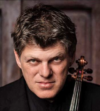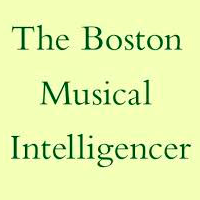Boston Philharmonic: Hi Ho Silver

“I wish Elgar would write something for violin,” Fritz Kreisler told an English newspaper in 1905.
For the renowned violinist, the music of Edward Elgar stood in the same pantheon as that of Beethoven and Brahms. So, Kreisler approached him for a concerto that would mark a significant first for an English composer.
Yet more than a century later this once popular score—perhaps the pinnacle of Elgar’s achievement ―has been pushed nearly to the fringes of virtuoso repertoire. In Boston it has appeared with startling infrequency, having only been programmed five times in Symphony Hall since 1934.

Fortunately, Benjamin Zander and the Boston Philharmonic came to Symphony Hall last weekend to shed fresh light on this music while opening their 45th season. If there was a takeaway, it’s that past and present converged in this music with as much ebullience as grace.
The soloist was Guy Braunstein, who has long enjoyed a career as both soloist and orchestral player. Elgar’s lush concerto found him making his Boston debut by filling the spotlight without being consumed by it. His lyrical passages flickered with a Kreisler-like delicacy. But his inclination to push and pull the tempo at will made the score’s climactic points emerge with natural fervor. In that, Braunstein and Zander took the expansive approach of Yehudi Menuhin, whereby every corner of the concerto’s 50-minute span is filled with detail.
Through it all, Braunstein worked like a painter, his tone by turns silvery and grainy to capture the emotional sweep of each moment. The Allegro ebbed and flowed, the soloist a steady ballast against waves of orchestral forces that Zander coaxed in response.
The Andante took on an almost pastoral glow. Braunstein’s line rose, twisted in supple shapes that then wove inside and out of the accompanying canvas. Yet there was always a firm sense of momentum and direction. The Allegro molto coursed with wild abandon in the right places. The cadenza resolved it all with a mix of both solace and impish glee. If this was a heroic reading, it was also one that pitted the soloist as both a stalwart and sensitive force, pressing against the boundaries of this music without resorting to self-indulgence.
Braunstein’s encore, his own variations on the Beatles’ song “Blackbird,” proved just as captivating. Unfolding each variation, Braunstein kept an ideal balance between flamboyance and stately assurance. This performance suggested that he embodies the very art of equilibrium.
Zander’s reading of Beethoven’s Symphony No. 7, by contrast, was all grit and exuberance. Fleet tempos allowed for the shifts in mood to come off with outsize force. Accents in the slow introduction feel like
hammers, lines in the ensuing Vivace thundered.
He even took the Allegretto at a swift one beat per bar. The Scherzo tittered―even guffawed―more than it lilted. But delicate moments came across as well: the Trio, while also moving earnestly, still conveyed its bucolic solace.
Everything culminated in the finale to powerful, terpsichorean effect. If, as Wagner said, this symphony rose to the apotheosis of the dance, Zander’s direction made it fly with almost desperate enthusiasm.
The opener, Rossini’s overture to William Tell, gave us an unexpected treat. Long popular with military bands as well as with television shows and cartoons, the overture seems to have fallen into some neglect, at least locally.
But Zander’s welcome reading made the score sound as fresh as ever. Colors came in abundance: Rafael Popper-Keizer’s opening cello melody sounded with rosy warmth, winds and strings conveyed the ensuing storm with shattering intensity, and the brass played the famous gallop (used as the theme for The Lone Ranger) with the verve of a hunting party. We’ve come to expect from Zander and the Boston Philharmonic performances of such power and zest that the old sounds new.
Click here to view the Concert Program.
Click here to listen to Ben’s Beethoven Symphony no. 7 recording with the Philharmonia Orchestra.
 Aaron Keebaugh - The Boston Musical Intelligencer
Aaron Keebaugh - The Boston Musical Intelligencer